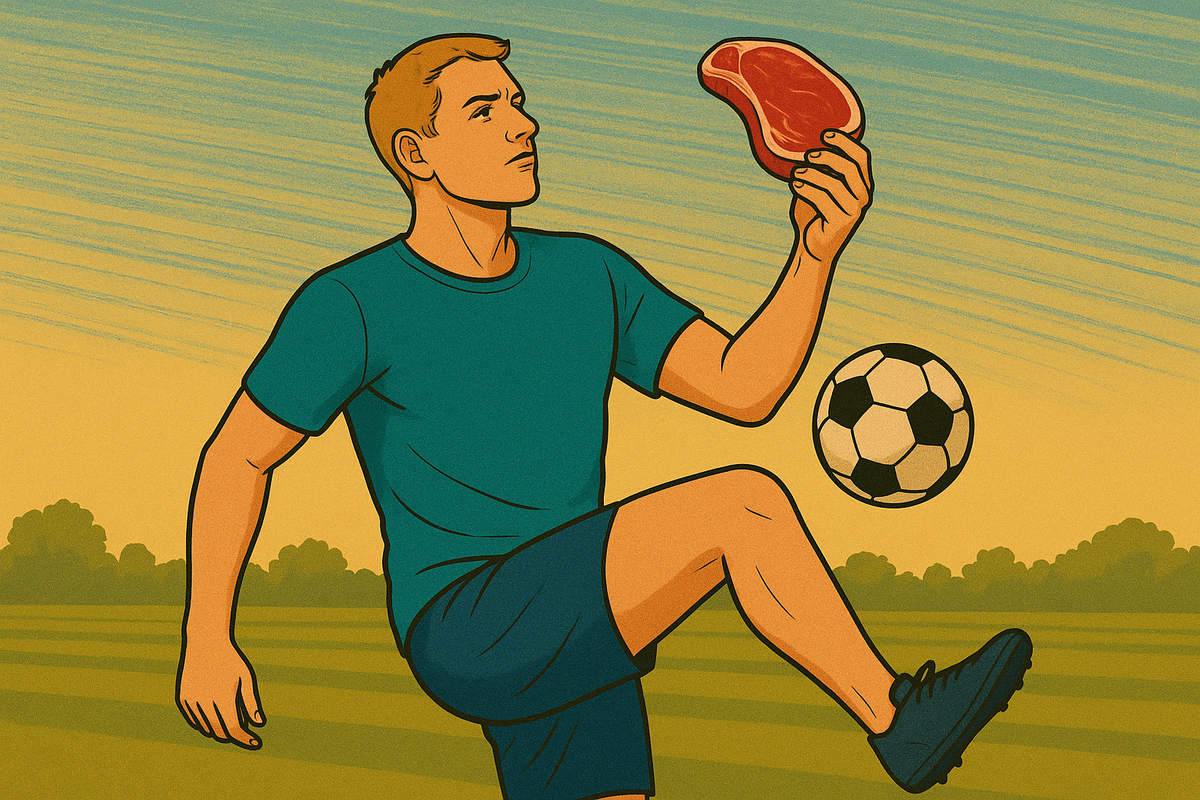
Ever wondered if you could ditch carbs completely and still crush your workouts? The carnivore diet—essentially an all-meat approach—has been gaining traction among fitness enthusiasts who claim it can supercharge athletic performance. But before you toss your sweet potatoes and oatmeal in the trash, let’s look at what happens when real athletes go full carnivore.
What Happens When Athletes Go Carnivore?
Imagine your body as a hybrid car that can run on two fuel sources: carbs (like high-octane gasoline) and fat (like a slow-burning alternative fuel). The carnivore diet forces your body to rely almost exclusively on fat for energy—a dramatic shift that doesn’t happen overnight.
A recent study followed a female college soccer player who went carnivore one month before her competitive season. Think that’s bold? It certainly was. Her diet consisted mainly of whole eggs, bacon, burgers, steaks, butter, salt, sugar-free condiments, no-sugar yogurt, and small amounts of fruit.
The Performance Problem
Here’s where things get interesting. When researchers tracked her performance during games, they discovered something concerning: compared to her teammates, our carnivore athlete was working significantly harder to achieve the same results.
Her TRIMP score (a measure of workout intensity) was nearly 15% higher than her teammates, despite covering similar distances. Think of it like two cars traveling the same route—but one is burning way more fuel to get there.
Her heart rate during games was also significantly higher, and her GPS work rate (how efficiently she moved) showed she was burning more energy for the same output. Not exactly what you want when competing at a high level!
The Carb Experiment
Halfway through the season, nutrition experts suggested a small but crucial change: eat some carbs closer to game time.
The intervention was minimal—simply eating the same amount of fruit (about 16g of carbs) one hour before games instead of 2-2.5 hours before. That’s like eating half a banana or a small apple closer to kickoff. Not exactly carb-loading!
The Surprising Results
The results? Dramatic improvement. After making this tiny adjustment:
- Her workout intensity (TRIMP) dropped from being 15% higher than teammates to 10% lower
- Her heart rate during games went from being significantly higher than teammates to slightly lower
- Her work rate efficiency improved substantially
In other words, just by eating the same amount of carbs closer to game time, she started working smarter, not harder. It’s like finding out your car runs much better if you fill up right before the long drive rather than the day before.
What This Means for You
If you’re experimenting with low-carb or carnivore approaches, here are some practical takeaways:
For Recreational Athletes
- If you’re going low-carb, consider strategic carb timing around your most intense workouts
- Even small amounts of carbs (15-20g) can make a difference if consumed right before activity
- Monitor your perceived exertion—if workouts feel unusually hard, your carb timing might need adjustment
For Competitive Athletes
- Consider whether your body has fully adapted to fat metabolism (this can take months, not weeks)
- Track performance metrics objectively rather than relying on how you feel
- Work with nutrition professionals to optimize your approach
For Weekend Warriors
- If you’re doing a Saturday morning group ride or Sunday league game, try eating a small piece of fruit 30-60 minutes before
- Notice if your perceived effort decreases with this simple change
- Keep in mind that short, intense efforts rely heavily on carb-based energy systems
The Bottom Line
This doesn’t mean the carnivore diet can’t work for athletes—but it does suggest that timing matters and that even minimal carbs strategically placed can significantly impact performance. Your body might need less carbs than you think, but it might still need some, especially right before demanding activity.
Think of it like this: even if you’ve trained your body to be a fat-burning machine, having a little high-octane fuel in the tank for race day just makes sense.
This article is based on research by Bowser, Cloutier, and Romano, published in the Journal of Exercise and Nutrition, Volume 7, Issue 1, 2024. The study observed a female NCAA Division II athlete on a carnivore diet throughout a competitive soccer season.
Discover More
- Can Creatine Save Your Workout When Cutting Carbs?
- Carnivore Diet for Athletes: Do You Need Carbs After All?
- Mix It Up! How to Combine Cardio and Strength Training for Maximum Results
- Rocking Your Walk: How Unstable Shoes Could Strengthen Your Feet and Improve Your Balance
- Trail Running Safety: Navigate the Path to Injury-Free Adventures
- Tech Your Way to Better Fitness: How Older Adults Are Using Digital Tools to Stay Active
- Rest Periods Matter: Finding Your Sweet Spot for High-Intensity Sprint Training
- Supercharge Your Jump: How Adding Bands to Your Deadlift Can Boost Performance
- Caffeine Before Exercise: Is Your Pre-Workout Cup of Joe Actually Helping You Burn Fat?
- Paws-Itively Perfect Exercise: How Your Dog Can Be Your Best Workout Partner
- The Long and Short of It: How Pole Length Can Boost Your Cross-Country Skiing Performance
- Time-Restricted Eating: Get Leaner Without Losing Your Gains
- Boost Your Strength & Shed Fat: Essential Amino Acids + Resistance Training
- Finding Your Perfect Fit: How Footwear Affects Performance and Injury Risk
- HIIT vs. Moderate Exercise: The Mood Rollercoaster Your Workout Takes You On
- Hydration Hype: Do Specialty Drinks Boost Exercise Performance?
- Move It or Lose It: How Your Daily Movement Patterns Affect Your Lifespan
- Moving Matters: How Small Steps Can Keep You Stronger for Longer
- Say Cheese! How Adding Cheese to Resistance Training Can Improve Your Body and Gut Health
- Take Your Workout to the Great Outdoors: How Nature Boosts Your Exercise Benefits See more
